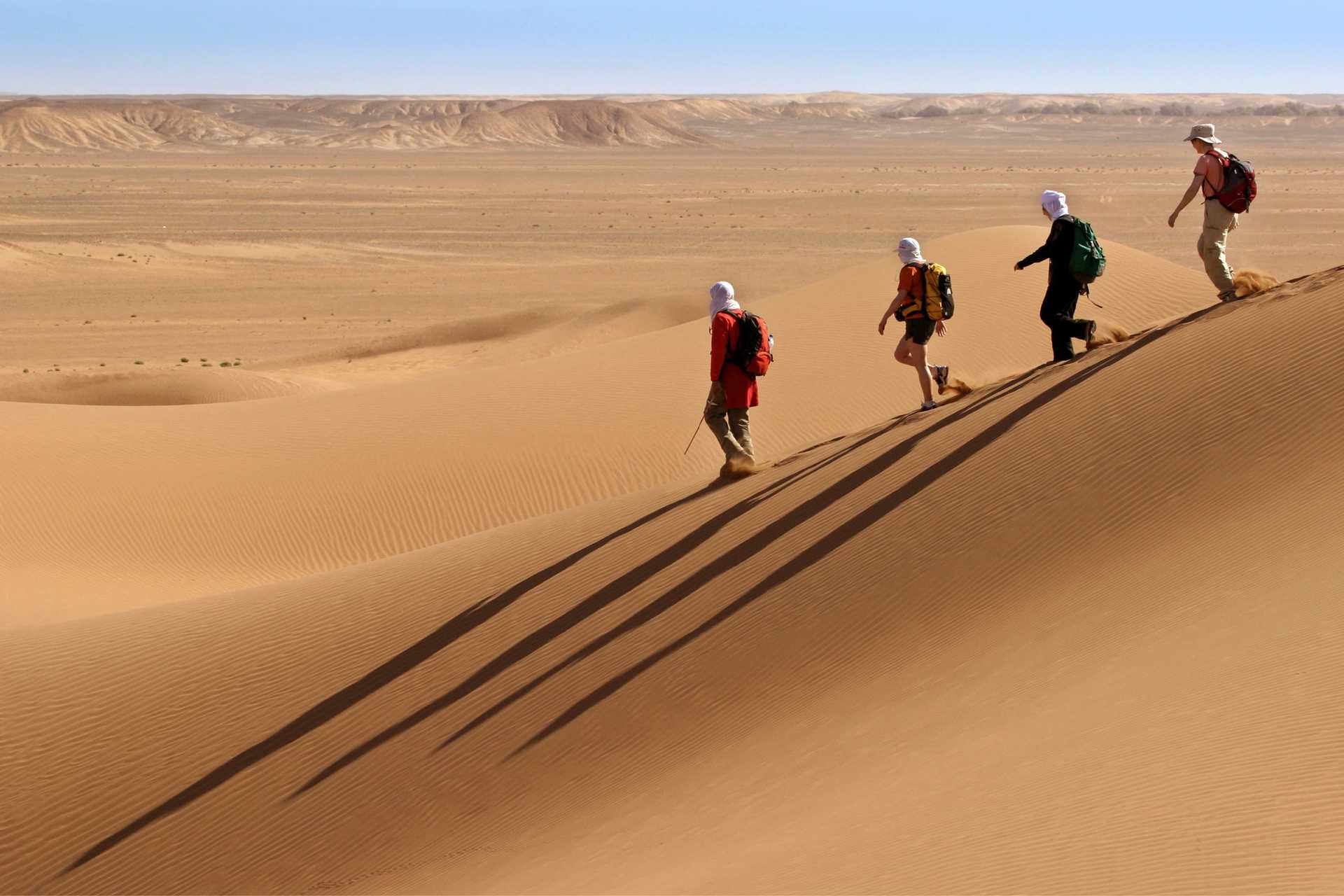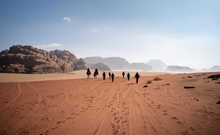Sahara Desert Explorer
- Trekking

Contact
our UK team

Arrive in Marrakesh and transfer to your hotel. After clearing immigration and collecting your luggage, exit the arrivals building and where one of our team will be waiting for you. If you wish to exchange money in the airport, make sure you do this before leaving the building. Our transfer will then take you to your riad. Depending on the riad you are staying in, you may be dropped nearby where a member of staff from the riad will come meet you and help you with your bags. You can then spend the afternoon exploring the famous Medina markets and hidden souks of the city. Your pre-trek briefing will take place this evening at 7pm in the riad foyer, here you will meet your guide and gain an in depth understanding of the trek you are about to embark on.
We depart early this morning to cross the stunning peaks of the High Atlas on our way to Ouarzazate. On the way, we cross Tizi n’Tichka pass. With a high point of 2260m, you will be able to take in the stunning views across the Atlas mountains before making a stop at the rural village of Telouet. Here you will visit the magnificent Glaoui Kasbah, former home of the head of the Glaoui tribe who is also referred to as “Lord of the Atlas”. We continue our journey towards Ouarzazate, or the ‘Gateway to the Desert’ and marvel as the landscape changes around us, taking us through the dramatic Draa Valley and ancient hillside settlements of Zagora before reaching our final destination and camp for the night in the Faija Plateau.
After breakfast, we make our final preparations before setting off on our trek. We trek across the plateau towards the djebel Bani mountain range and ascend the famous Oum Laachar pass. Along the way, we will find a shaded spot to take our lunch and a rest before continuing across the stunning desert landscape to Oued Lemhasser where we can relax at tonight’s campsite.
Today our caravan continues it’s way through the shifting sands, falling into a soothing rhythm as we progress towards the beautiful Chegaga Dunes. All around us the sun reigns supreme. In the middle of our journey, we have a hearty picnic then spend a luxurious few hours siesta’ing before setting off to today’s final destination – our campsite nestled in the Chegaga Dunes themselves.
After another night camped under the star-scattered desert skies, today we make our way southwards, plodding through the Ergs or ‘sand seas’ at the pace of our caravan to our camp for the night.
Waking for our penultimate day in the Sahara, we enjoy a hearty breakfast under the endless expanse of blue sky. As we walk, we can take shade and stop for lunch under the tamarisk trees scattered throughout the landscape. Today we will finish at the dry river of Oued Naam, a meeting place for nomadic tribes.
Our last day trekking amongst these sandy, rolling waves, we end our trek at the magnificent Mhamid Dunes. Here we say goodbye to the desert as we climb aboard the 4x4 which will take us back to Marrakesh. There will be plenty of breaks along the way, including a stop in the historic city of Zagora, where you can take shade under the walls of it’s eleventh century fortress or look out for the road to Timbuktu!
Transfer from your hotel to the airport to catch your return flight.
This adventure is of moderate difficulty. You will be required to walk for up to 6 hours a day for 6 consecutive days. There may be up to 600m of vertical ascent and the temperatures could reach as high as 35°C. It is essential that you drink plenty of water and stay well hydrated. Pathways through the dunes are often loose and care should be taken to avoid slips and trips, you may find walking poles are useful. You should be in good physical condition with recent experience of hiking for several days in row.
During your trek your team will prepare all of your meals.
At breakfast there is jam, bread, cookies, fruit, juice, butter, tea, coffee and sometimes a local speciality. Afternoon Tea is served at the
end of the days walking, once you get to camp. In addition to mint tea and
other hot drinks, there will be some biscuits or a light snack provided to help
restore some of the energy you’ve just burned off. A typical lunch will be a
salad with fresh vegetables, corn, boiled eggs, tuna and rice or pasta served alongside a traditional curried dish, such as lentil dahl or a tagine.
Evening meals will always be made up of delicious Moroccan cuisine prepared with locally sourced ingredients. There will normally be a soup starter
followed by a tagine or stew with salad, couscous or pasta and bread. We can provide vegetarian, vegan or gluten
free meals on request. If you have
special dietary requirements please let us know when booking your trip.
In Marrakesh, at the start and end of
your trip, you can purchase meals at the Riad or head out in to the city to
find a restaurant. The Riad is a 15-minute walk from Jamaâ el Fna Square where there are numerous restaurants with international options such as pizza and burgers, French and local cuisine, or if you are wanting something lighter then look for the roadside cafes offering the locals favourite, Omelette Khaali (lamb omelette) and Mint Tea.
Large bottles of water are taken on the trek and will be used to fill your personal bottles / bladder. You should also bring a water purification system or tablets for the duration of the trip. You will need to buy your own water whilst in Marrakesh. There are plenty of market stalls and shops selling bottled water near to your Riad, hot drinks and bottled water is also available at the Riad.
We provide a good quality 3 man tent. They are designed to sleep three people, but we only ever sleep 2 to a tent, to ensure you have plenty of space for you and your gear. Keep in mind, these are proper mountain tents, designed to cope with extreme conditions so don’t expect to be able to stand up and walk around inside! A foam mattress per person will also be provided. You will be required to assist with pitching your own tent at the end of each day.
Once you set foot on the trek,
your Lead Guide has overall responsibility for your health and welfare. You
must listen carefully to all their instructions and follow them carefully. The
Guide’s ruling on any matter is final.
Main bag weight: 15kg
On our Moroccan adventures you will need
to arrive in Menara Airport, Marrakesh on Day 1 of your trip. For UK travellers there are direct flights with BA, Easy Jet and Ryan
Air from Heathrow, Gatwick, Luton, Stansted and Manchester. With a short stop
in Europe, you can travel from virtually any major UK airport. The flight time from the UK is roughly four
hours.
There are no direct flights to Marrakesh
from the USA but, it is only necessary to have a short stop of less than 3 and
a half hours somewhere in Europe. Delta Airways operate convenient flights via
Paris from New York, Boston and Los Angles. TAP Air Portugal, American Airlines
and United provide further options.
Menara Airport is located 8km outside the
city of Marrakesh and the transfer to your Riad will take around 30
mins. Once
you have cleared immigration, collected your luggage and exchanged any money you need to, please exit the
arrivals doors where one of our team will be waiting for you.
A pre-trek briefing will be held at 7pm on the evening of Day 1 in the foyer of your Riad in Marrakesh and we strongly recommend that you book a flight that arrives in time for you to attend the briefing. If you should arrive on a later flight, you will be given the full briefing the next morning before you set off on your trek.
The local currency is the Moroccan Dirham (MAD). For the most up to date exchange rate please visit www.xe.com.
Guide: 100-160 MAD ($10-15)
Cook: 85-110 MAD ($8-10)
Mule/Camel
drivers:
160-210 MAD ($15-20) – per driver (you may have anywhere between 3-7 mules and
drivers depending on your group size)
Drivers can be tipped after each journey, between 10-20 MAD
depending on the length of your journey. Your cook and mule / camel drivers can
be tipped at the end of your trek. Your lead guide can be tipped after you
return to Marrakech at the end of your tour.
Please
tip in Moroccan Dirham rather than in your home currency.
Different crew members will be with you for different stages of
your trip to Morocco:
This is for guidance only. Tips are always discretionary and if
you are not happy with the service you have received you do not have to pay
tips.
| From | To | Price | Availability | Book | Enquire |
|---|---|---|---|---|---|
| 21/03/2026 | 28/03/2026 | £1,249 $1,629 |
Available
|
Book now | Enquire now |
| 17/10/2026 | 24/10/2026 | £1,249 $1,629 |
Available
|
Book now | Enquire now |
| 31/10/2026 | 07/11/2026 | £1,249 $1,629 |
Available
|
Book now | Enquire now |
| 14/11/2026 | 21/11/2026 | £1,249 $1,629 |
Available
|
Book now | Enquire now |
| 05/12/2026 | 12/12/2026 | £1,249 $1,629 |
Available
|
Book now | Enquire now |
| 17/04/2027 | 24/04/2027 | £1,229 $1,599 |
Available
|
Book now | Enquire now |
| 24/04/2027 | 01/05/2027 | £1,229 $1,599 |
Available
|
Book now | Enquire now |
| 16/10/2027 | 23/10/2027 | £1,229 $1,599 |
Available
|
Book now | Enquire now |
| 30/10/2027 | 06/11/2027 | £1,229 $1,599 |
Available
|
Book now | Enquire now |
| 13/11/2027 | 20/11/2027 | £1,229 $1,599 |
Available
|
Book now | Enquire now |
| 04/12/2027 | 11/12/2027 | £1,229 $1,599 |
Available
|
Book now | Enquire now |
Want to ask us a question or book a private trip? Don't hesitate to contact us!
Contact us